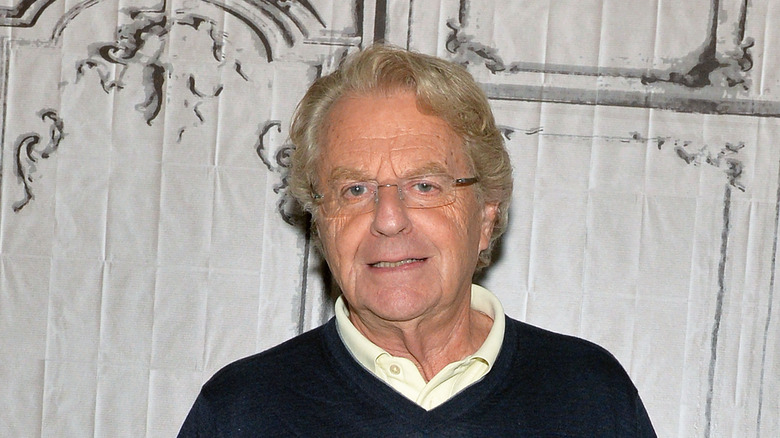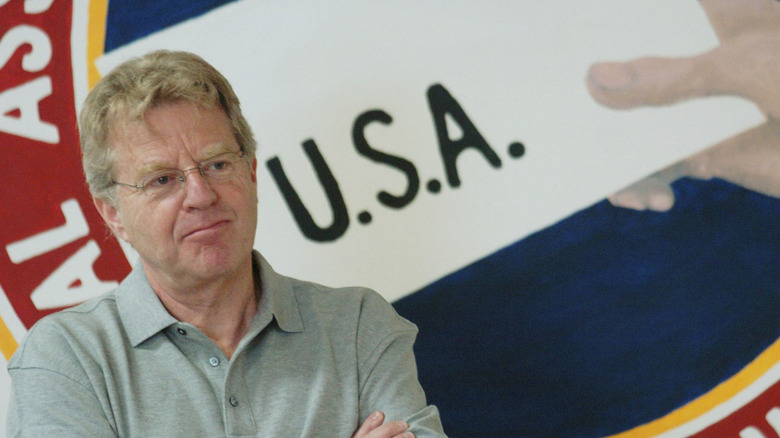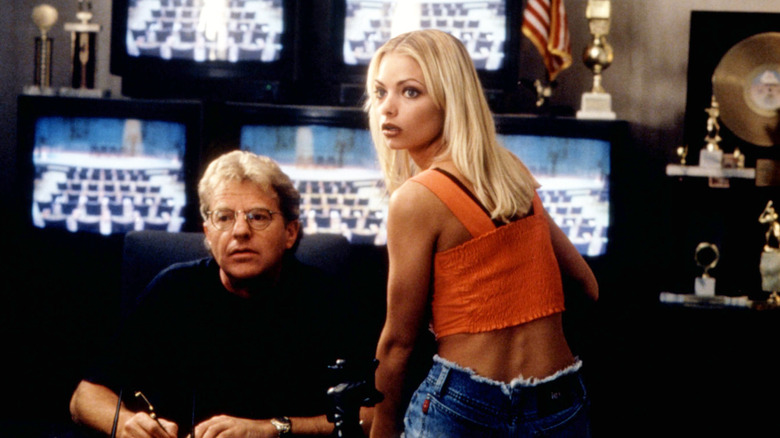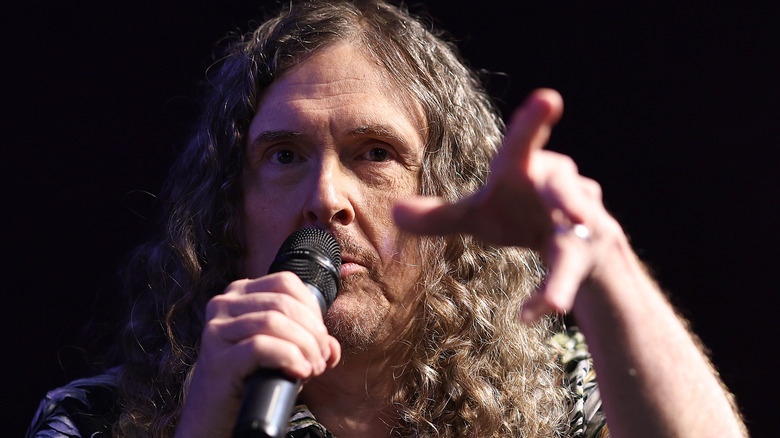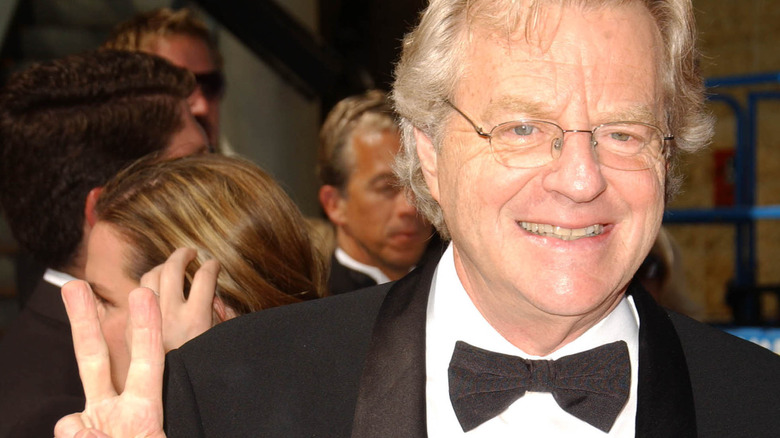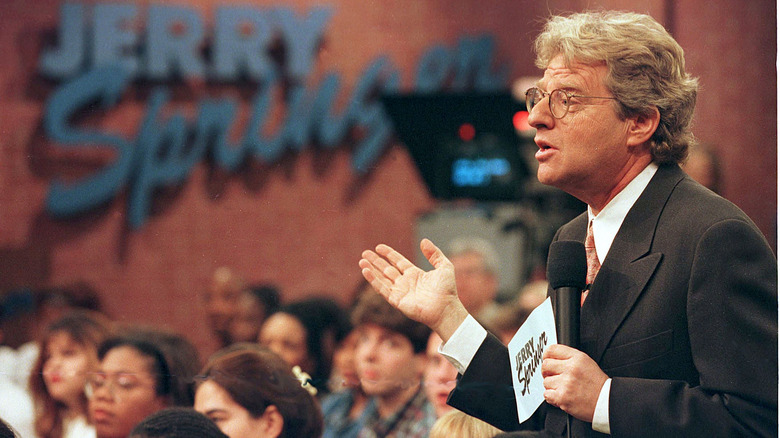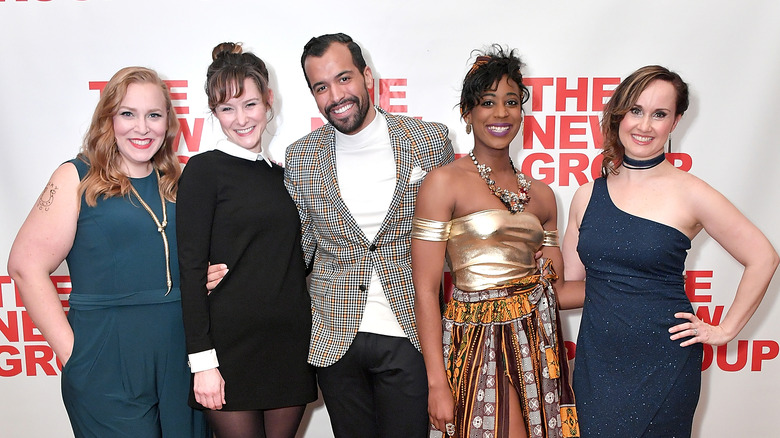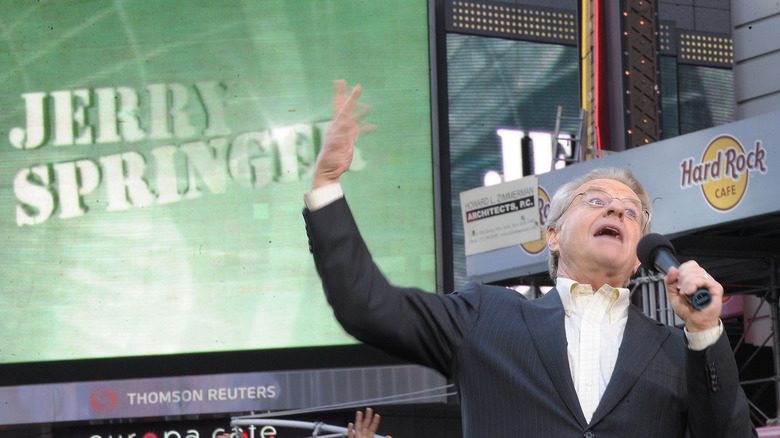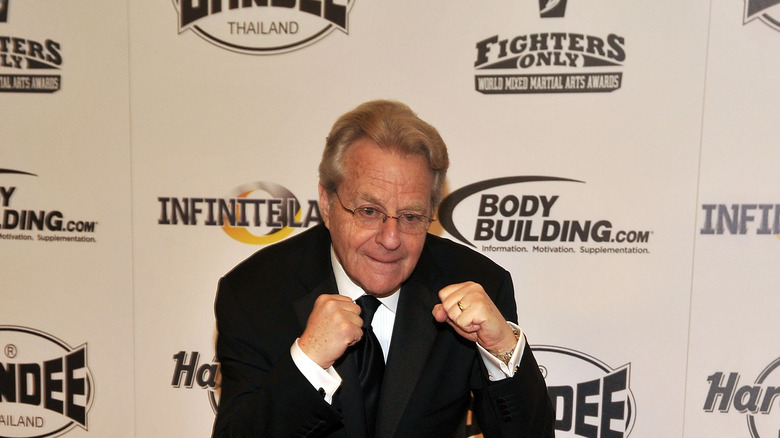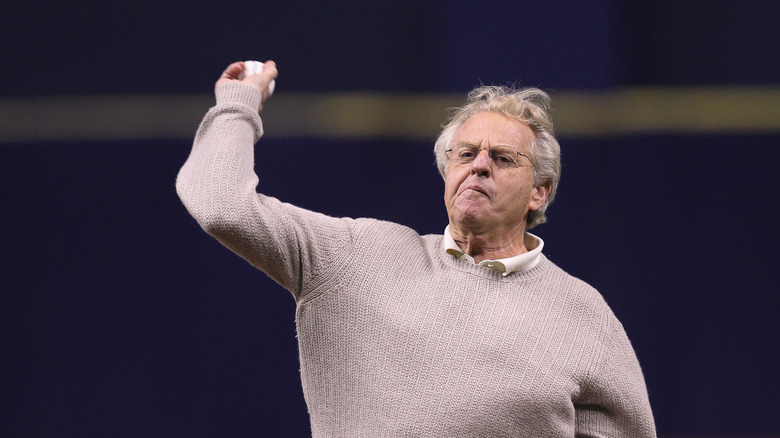Jerry Springer Facts Only Hardcore Fans Will Know
Jerry Springer may be best known for the brawls on his self-titled daytime TV show, but there was more than meets the eye (or fist, as the case may be) to the iconic host. "The Jerry Springer Show" ran for a whopping 27 seasons between 1991 and 2018, featuring racy topics and more than a few chaotic fights.
Although this is the program Springer is best known for now, he actually had a vibrant career before and after his long-winded stint on his talk show. From a semi-successful foray into politics to inspiring a "Weird Al" Yankovic song, Springer seems to have been a jack of all trades.
Springer died from pancreatic cancer at the age of 79 in April 2023, but his legacy lives on. And considering how interesting Springer's career was, it should come as no surprise that there are plenty of fascinating nuggets about his long-spanning series and the guy who brought it to life. So, here are some Jerry Springer facts — about both the man and his show — that only hardcore fans know.
Springer's political beginnings
Who would have thought that the man cited as the king of trash TV had a career in politics before hosting "The Jerry Springer Show"? Before Springer got into the daytime TV game, he completed a degree in political science and later earned a law degree. He has some pretty impressive notches on his political resume, too.
Not only did Springer work on Robert F. Kennedy's campaign, but he also served as a Cincinnati city council member. Springer could have been a guest on his future show, though. In 1974, he kissed his city council position goodbye when allegations of the politician paying sex workers emerged. However, he was back on the council a year later and eventually earned the title of mayor of Cincinnati. Some of Springer's political passions included civil rights and his anti-war stance, which he carried on as the host of "The Jerry Springer Show."
The daytime ringmaster
Just because someone spends more time in front of the camera than off it doesn't mean they're meant for Hollywood. You'd think that playing a fictionalized version of yourself and your job would be a breeze, but Springer's 1998 film "Ringmaster" combated that assumption. Not many critics and fans watched the little-known movie, but it has a measly 20% rating on Rotten Tomatoes. The film even features a storyline from the real-life talk show: a daughter sleeps with her stepfather.
Springer won a Razzie award in 1999 as the "worst new star." Ouch, that's got to hurt. He had greater success playing himself on multiple projects like "Roseanne," "The X-Files," and "The Simpsons." But unfortunately, "Ringmaster" wasn't the last time Springer tested his acting chops: He also appeared in projects like "A Fare to Remember," "George Lopez," and "Days of Our Lives." Some people say to keep your day job, but the general consensus for Springer was to keep his daytime TV job and leave the acting to the professionals.
He puts the sin in syndication
It's largely considered a badge of honor in Hollywood to inspire a "Weird Al" Yankovic song. Plenty of films and pop culture moments have received a "Weird Al" tribute, but Springer snagged the rarity of getting the song named after himself (and his show). The iconic song chronicles human fascination with reality TV and is a parody of the Barenaked Ladies song "One Week." The tempo of Yankovic's parody doesn't perfectly match the original as well as most of his jams, but it almost mirrors the building energy of a brawl.
Just like the series itself, Yankovic's Springer tribute is offensive, with demeaning lyrics that don't hold up in a modern landscape. And hey, nothing sums up the show's vibe (and fans who religiously watch it) quite like his lyric: "Once you start watchin', there's just no stoppin'. Your brain shuts down, then your IQ's droppin'. Jerry's the king of confrontation; he's a sensation; he puts the 'sin' in syndication."
The vanilla origins of Jerry Springer
With over 25 years of utter mayhem and fights on Springer's show, it's easy to forget that its origins weren't always so violent and jaw-dropping. Given that Springer only accepted his previous anchor position with the promise of a political segment, it's unsurprising that "The Jerry Springer Show" began as a serious talk show with politics taking center stage.
Springer only got his gig after Phil Donahue left the talk show spotlight, and Springer's show emulated a similar vibe. In the early days, Springer tackled issues like racism, homelessness, and other pressing current events. Yet once a network gets a taste of blood, it pounces like a shark.
Given Springer's habit of bringing individuals with very opposing views onto the show, it was only a matter of time before a fight broke out. A few years into the show's long run, the series' first fight boiled down to a racist getting knocked out and an ensuing brawl that lasted about 15 minutes, according to Springer. Naturally, viewership skyrocketed, though Springer initially thought the fight would doom his career, as he told Daily Blast Live. And thus, the show's energy changed forever. Not all of Springer's fellow TV hosts respected his show: Oprah accused Springer of being the ringmaster of a "vulgarity circus" and called the show sick.
Springer regretted his show's violent legacy
Given Springer's political stances and outspoken disdain for violence, it's surprising that he hosted such an aggressive TV show for nearly three decades. As people age, they often take a look at their legacy and weigh their triumphs against their regrets. And as it turns out, Springer wasn't wholly proud of his time hosting "The Jerry Springer Show." It wasn't until Springer's 78th year that he opened up about his regrets during an appearance on a podcast hosted by David Yontef. On Behind the Velvet Rope, Springer told Yontef, "I just apologize." He took the apology further, genuinely expressing remorse. He added, "I'm so sorry. What have I done? I've ruined the culture."
Of course, Springer's patented humor took over, and he bantered, "I just hope hell isn't that hot because I burn real easy. I'm very light-complected, and that kind of worries me." The show has featured some pretty bonkers storylines over the years, from disturbing bestiality, horrifying instances of incest, and enough fights to last a lifetime. Sadly, the show even had violent consequences when guests' deepest darkest secrets came out for the world to see. In these moments, it's clear that not everything was scripted — even though we almost wish it was.
Springer spoke out against antisemitism
The brawls on Springer's show may have been sensationalized, but his real-life fights were far more productive. Springer was known for advocating for the rights of oppressed groups and sharing anti-war sentiments. But one cause hit close to home. Springer's parents were Jewish-German refugees, and Springer went on BBC1's "Who Do You Think You Are" segment to get some answers about what happened to his family during Nazi Germany. A heartbroken Springer discovered that a staggering number of his family members died at the hands of Nazis and concentration camps.
During an interview with The Independent, Springer said, "But the truth is that these people had no moral compass. What you saw in Germany then was a moral vacuum, where very few people had the courage to stand up and say to the Nazis, 'You want me to do that? Are you crazy?'" It's impossible to imagine the toll that trauma would have on someone unless they lived through it. He explained that the wounds were so deep that his parents couldn't even watch "The Sound of Music." Springer cited his family's experience as the spark that made him passionate about politics and civil liberties.
One of Springer's most passionate moments on "The Jerry Springer Show" occurred when he faced off with members of the KKK and called them out on their racist behavior. With his own history, it's easy to see why Springer fought so hard for equality.
Too hot for TV
It's hard to believe that "The Jerry Springer Show" could get even more raunchy and uncensored, but the "Too Hot for TV" VHS tapes and DVDs proved that assumption wrong. Between foul language, nudity, and even more violence than the daytime TV show would allow, the extra content was a money-making grab that gave hardcore fans of the show, well, more hardcore content.
Yet those weren't Springer's only projects that capitalized on the success of the show. VH1 released two documentaries called "The Springer Hustle" and "When Jerry Springer Ruled the World." Because an hour-and-a-half movie wasn't enough, the 2007 mini-series "The Springer Hustle" was divided into eight episodes. The series tells the tale of the show's producers, Springer, Steve Wilkos, Angel Anes, and Tobias Yoshimura.
Meanwhile, "When Jerry Springer Rules the World" focuses more on Springer and how the show became the infamous daytime TV staple that people still talk about today. "Too Hot for TV" and the two documentaries couldn't be more different, but they're essential viewing for any devoted Springer fans.
A dynamic host
Springer's legacy is synonymous with "The Jerry Springer Show," but the series offered the host plenty of other opportunities. He hosted quite a few shows and episodes of TV during his heyday. In fact, his role in front of the camera wasn't always hosting at all. After his failed election as governor of Ohio, Springer got an offer to be a news anchor in Cincinnati. Not only did Springer bolster ratings, but he even won a few regional Emmys for his work.
As it turns out, Springer never intended to host his own show. He was thrust into stardom under his contract with the network, and the rest is history. On top of "The Jerry Springer Show," Springer had hosting stints on "America's Got Talent, "Judge Jerry," and he even competed in "Dancing With the Stars." Springer had a wholesome reason for his time on "Dancing With the Stars," too: He wanted to learn to waltz for his daughter's wedding. Springer wasn't always in front of the camera. He started a podcast in 2015 that continued until 2022. All in all, Springer's interests and career paths are as diverse as they come.
Unlikely enforcers
Naturally, a series like "The Jerry Springer Show" required a pretty intense security detail — whether the rumors of scripted fights are true or not. As it turns out, the show has hosted some pretty big names as security throughout its run. Anyone who's seen an NHL game can attest that hockey players are on a whole new level when it comes to fighting — and they do it on skates. Though breaking up fights isn't something that comes naturally to most NHL players, the 11-season NHL veteran Joe Corvo had a one-episode stint on "The Jerry Springer Show." Given that Corvo pleaded guilty to punching a woman in the face in 2003, he's definitely not someone who should be in charge of security.
NHL vet-turned-analyst Adam Burish also served as a security detail on the show. As reported by NBC Chicago, Burish remarked on the experience, saying, "Overall, the show was such a blast to be a part of." He noted his failed attempt to break up a fight and his surprise at seeing a slew of Blackhawks fans in the audience.
The NHL players weren't the only athletic additions to the show: Martial artists Andrei Arlovski (UFC heavyweight champion), Shonie Carter (WEC Welterweight Champion), and Bas Rutten (UFC Heavyweight Champion) also appeared on the show in a security capacity.
From talk show to ... an opera?
When you think of Jerry Springer, you think opera, right? Well, maybe you should. Though a daytime talk show with more fighting than talking doesn't exactly scream "opera," The New Group put on a musical based on the show titled "Jerry Springer — The Opera."
Of course, the opera was just as salacious and irreverent as the show it was based on. But despite not taking itself too seriously, the opera won the honor of a best new musical Olivier Award. The opera boasted some pretty impressive names, too. John Rando took his place in the director's chair, while Chris Bailey handled the choreography, and Richard Thomas was the creative mind behind the music, book, and lyrics.
The opera wasn't Springer's only dalliance with the musical arts, either. In 2009, the daytime host won a role in London's production of "Chicago." The role even allowed Springer to go back to his lawyer roots as Billy Flynn. Springer also took on the role of the narrator of "The Rocky Horror Picture Show" on Broadway in 2001.
Talk to the hand (cause the face ain't listening)
You wouldn't necessarily think that a daytime show that has more fights than a WWE match would be a springboard for generations of popular slang. Yet Springer's show is largely cited as birthing the '90s insult, "talk to the hand." During an interview with TV Insider, Springer remarked on the show's history of popularizing slang through its decades on the air.
When it comes to the "talk to the hand" staple, Springer said, "For a lot of people, it was the first time they'd heard that phrase." He added, "A lot of the new phrases from the younger generation, you get to hear first on our show. Now they all say, 'I'm not hearing that!'"
The "talk to the hand" phrase was so synonymous with the series that the bit has a self-titled song in "Jerry Springer: The Opera."
Springer was a doting family man
Springer may have taken on a fatherly role when he broke up fights on his show, but his paternal vibe also extended to his home life. The multi-faceted daytime host was married to Micki Velton for over 20 years, and he never remarried following their 1994 divorce.
Let's face it: Most blind dates turn out to be a bust. Yet, for Velton and Springer, it was the beginning of their love story. The couple dated for four years before saying, "I do." Little else is known about their relationship. And though the couple didn't last, Springer's continued to have a close relationship with his daughter Katie, who he mostly kept from the glaring lights of showbiz. Katie is allegedly blind and partially deaf, which led her father to get involved with advocating for disability rights. It's reported that Springer donated $230,000 to his daughter's school (where she taught special education) to create a space for disabled students. The doting father called it "Katie's Corner."
Springer told Mediabistro that his advice for the masses is the same advice he'd give to his daughter: "If you really work hard and be good at what you're doing, someone will notice, and you'll have another opportunity." He added, "Life just happens. The best you can be is prepared by being really good at what you do."
The Jerry Springer fight quota
There have been whispers of reality TV scripting shows since the genre's inception, but "Jerry Springer" is just as drama-filled as shows like "Real World" and "Catfish." It's hard to believe that a series could organically have that many fights without some showbiz interference — even with the outrageous storylines gracing the screens of "Jerry Springer" fans on a daily basis.
But it's not just fan speculation that fuels the rumor mill. In 1998, Diane Dimons from Extra interviewed 16 former guests of "The Jerry Springer Show," where they hurled accusations of fight quotas and scripted drama. One guest insisted, "We acted everything: when you have to punch, when you have to push. They wanted us to wrestle and throw each other around." Another guest claimed that she didn't even know the men that played her spurned lover and the other man. In a statement to the LA Times, a rep for the show said, "Our guests are required to be truthful in their rendition of personal experiences and sign a legal statement of such compliance."
That being said, most fans don't particularly care one way or another. Scripted or not scripted, there's no denying that the show is an entertaining train wreck you just can't look away from.
The Yankees were Springer's saving grace
Kids can often be crueler than adults. Springer had a lot to contend with when his family ended up in Queens after fleeing Europe. At only six years old, Springer's classmates mercilessly bullied him for his clothes and accent to the point of getting beaten up on the regular. So, what was the solution to this relentless harassment? Baseball, obviously. The sport is America's favorite pastime, after all.
When Springer's mom gifted her son a Yogi Berra Yankees jersey, he went from being the school outcast to the cool kid on campus. And thus began Springer's lifelong affection for the New York team. Fantasy camps in the major league aren't exactly cheap, but Springer made sure to follow his passion once he reached adulthood. There, he met his childhood hero Berra and played with a slew of Yankee greats during these camps.
While Springer was used to his talk show audience screaming his name, it was a whole other ball game coming from fans before a Rays vs. Yankees game. Though throwing the pitch at Yankee Stadium would have meant a bit more to the baseball enthusiast, he was more than happy to take to the mound to throw the first pitch on Tropicana Field. Everyone has to find that one thing that brings them solace. For Springer, that was the Yankees and the level of protection a simple jersey offered him as a child.
